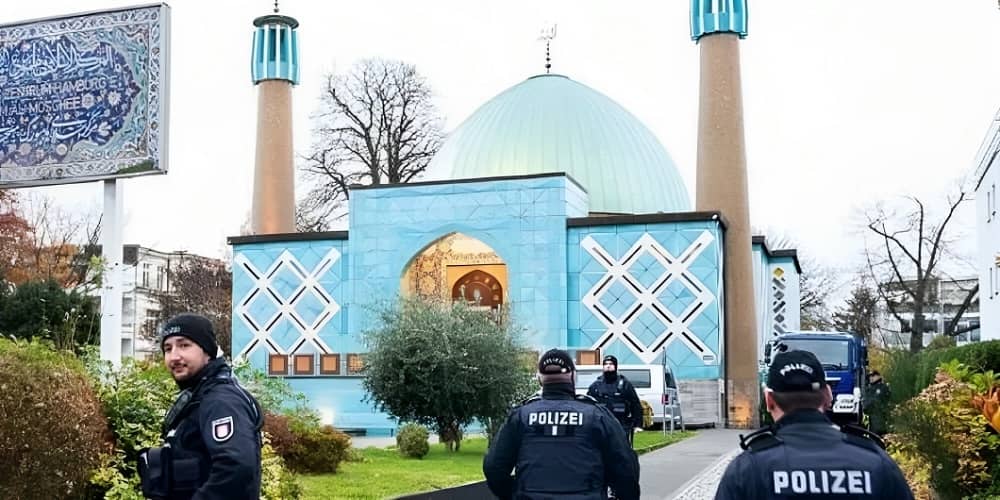
In a sweeping operation on Friday, October 16, German police raided 54 buildings across seven states, targeting the Islamic Center of Hamburg and other groups suspected of espionage and terrorist activities linked to the Iranian regime.
This bold move, involving over 500 officers, marked a significant escalation in Germany’s efforts to counteract Iran’s alleged espionage network within its borders.
The Islamic Center of Hamburg has long been under the scrutiny of the Bundesamt für Verfassungsschutz, Germany’s intelligence service, labeled as an Islamist outfit. The Center is accused of acting against the constitutional order and promoting divisive exchanges among different cultural groups, as stated by Germany’s Interior Minister Nancy Faeser. Additionally, there are suspicions of its support for Hezbollah, leading to ongoing investigations by security entities.
This operation extended beyond Hamburg, affecting regions like Lower Saxony, Hessen, Baden-Württemberg, Bavaria, Berlin, and North Rhine-Westphalia. The German Ministry of the Interior highlighted that these searches are a response to concerns that other associations are subsidiary branches of the Islamic Center of Hamburg.
THREAD
For more than four decades, the clerical regime in #Iran has consistently blackmailed other nations and considered #extremism as "leverage". 1/9https://t.co/ieaaOkZb6y pic.twitter.com/W9u5BJHXqs— NCRI-FAC (@iran_policy) September 6, 2022
The background of this investigation includes decades of surveillance by German intelligence on Iranian intelligence and espionage entities. Despite this longstanding awareness, diplomatic considerations had previously hindered significant actions against these networks. The Office for the Protection of the Constitution of Germany regularly reports on the terrorist activities of the Iranian regime, noting the National Council of Resistance of Iran (NCRI) and the People’s Mojahedin of Iran (PMOI/MEK) as frequent targets.
A notable incident in this saga was the 2018 arrest of Asadollah Assadi, a high-ranking Iranian diplomat, on German soil. The discovery of two notebooks in Assadi’s car – one containing bomb-making instructions and another documenting payments to various individuals across Europe – exposed the extensive reach of Iran’s espionage activities. Assadi’s notes also linked the Islamic Center of Hamburg to Tehran’s efforts to “export the Islamic Revolution” to Germany.
The failure of Western security services to effectively counter these networks raises questions about whether this inaction is due to political considerations or underestimation of the threat level. However, the conviction of Assadi and his accomplices by the Belgian judiciary has underscored the potential danger of Tehran’s sleeper cells.
Assadollah Assadi’s case is just the tip of an iceberg. Although he's been arrested & his verdict will be announced on Feb4, the network he led is largely untouched, & certainly, the regime has replaced Assadi with someone else. #EUTime4FirmIranPolicy #ShutDownIranTerrorEmbassies pic.twitter.com/o2Gllb9A61
— Masumeh Bolurchi (@MasumehBolurchi) February 1, 2021
Amidst these developments, the Iranian dissident group “GhiyamtaSarnegouni” has been instrumental in exposing details of the regime’s espionage and terrorist recruitment efforts. Their revelations suggest that Iran’s recruitment and training of agents for terrorist objectives are part of a broader strategy to compensate for internal instability and gain political leverage.
With recent events in Gaza highlighting the consequences of ignoring Iranian involvement in terrorism, the presence of Tehran’s network in Western countries is a reminder that the threat of terrorism is not a matter of “if” but “when.” Operations like the crackdown in Germany are crucial in addressing these complex and evolving security challenges.

MEK Iran (follow us on Twitter and Facebook), Maryam Rajavi’s on her site, Twitter & Facebook, NCRI (Twitter & Facebook), and People’s Mojahedin Organization of Iran – MEK IRAN – YouTu
